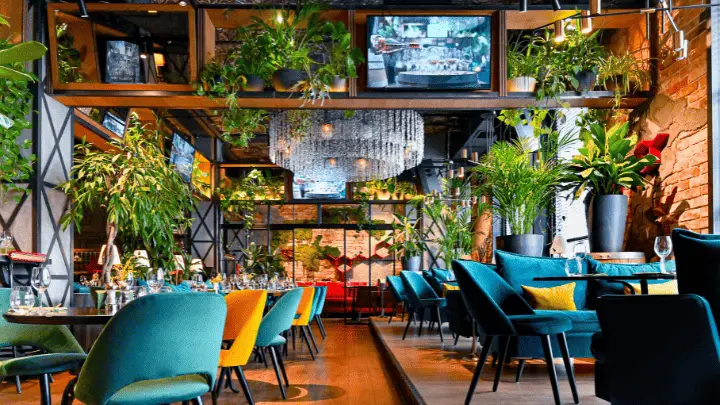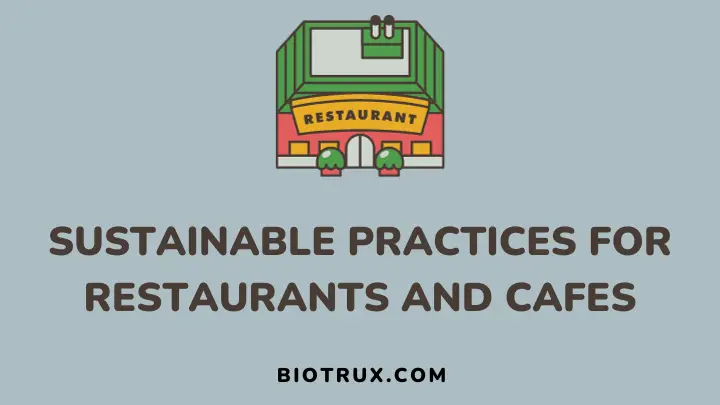In today’s world, sustainability is not just a buzzword; it’s a way of life. Adopting sustainable practices is a moral obligation and a smart business move for restaurants and cafes. Not only is this practice better for the environment, but it also saves money and attracts conscious consumers.
From reducing food waste to using renewable energy sources, there are countless ways for restaurants and cafes to incorporate sustainable practices into their operations. But it’s not just about being environmentally responsible.
It’s also about setting a positive example for others in the industry and showing customers that your establishment cares about making a difference. So, if you’re looking for ways to make your restaurant or cafe more sustainable, look no further – I’ve got you covered.
Join me as I explore the exciting world of sustainable practices for restaurants and cafes.
1. Start by Teaching your Staff About Sustainability
Sustainable practices in restaurants and cafes are more important than ever, and every team member must be aware of the necessary practices. But how can you get your staff on board? The key is to start at the beginning.
Teach your staff about sustainability in a way that’s both engaging and easy to understand. Here are a few tips to get you started:
- Provide training to your staff about the importance of sustainability
- Set goals and targets for sustainability
- You can also have a reward system in place to boost competition for achieving sustainability.
These small steps can greatly impact the environment while creating a more responsible and sustainable workplace culture. Work with your staff to build a brighter, greener future for everyone.
2. Prioritize Energy Efficiency
As restaurants and cafes begin to reopen their doors, they are presented with an opportunity to implement sustainable practices. Energy efficiency is a practical and effective step towards a sustainable future.
Businesses can save money on electricity bills by prioritizing energy efficiency while reducing their carbon footprint. Every little bit counts, from investing in LED lights to using energy-efficient appliances.
Restaurants and cafes can also incorporate energy-saving habits such as turning off lights when not in use and using natural light as much as possible. With energy efficiency as a top priority, businesses can positively impact the environment and their bottom line.
3. Source Local Ingredients
One of the practical tips for sustainable practices in restaurants and cafes is to source local ingredients. Not only does it support local farmers and producers, but it also reduces carbon emissions from transportation and promotes the freshest, in-season produce.
Imagine a customer ordering a salad with lettuce flown in from across the country versus a salad made with fresh lettuce from a nearby farm. The latter tastes better and contributes to the local economy and environment.
Examples include incorporating in-season fruits and vegetables into menus and sourcing meats and fish from nearby waters. In addition to sustainability, sourcing local ingredients adds a unique touch to the dining experience and highlights the region’s culinary diversity.
4. Find Ways to Reduce Food and Water Waste
Restaurants and cafes play a critical role in sustainable practices that can greatly impact the environment. As customers become more conscious of environmental concerns, restaurant owners must find ways to reduce food and water waste in their daily operations.
One of the simplest ways to achieve this is by training your staff to portion control better. This means providing the right size of food portions to reduce leftovers, thereby minimizing waste.
Also, promoting reusable cups and containers and composting leftovers are additional practices that help achieve a zero-waste goal. To conserve water usage, fix leaks promptly, install low-flow faucets and toilets, and train staff to be mindful of water usage.
5. Use Sustainable Food Packaging
Sustainable practices for restaurants and cafes are more important than ever in our quest to save the planet. One practical tip is to use sustainable food packaging. Plastic bags and Styrofoam containers are terrible for the environment, but many alternatives exist.
For instance, why not use biodegradable boxes or compostable food trays made from renewable resources? These eco-friendly options break down naturally over time, leaving no toxic waste. You can also choose packaging made from recycled materials to reduce waste further.
Take your sustainable food packaging game up by encouraging customers to bring their containers or use edible plates like banana leaves. Making small changes can have a big impact on the planet.
6. Embrace the use of Eco-Friendly Cleaning Products
Embracing eco-friendly cleaning products is a simple yet powerful way for restaurants and cafes to make sustainable choices. These products are formulated with environmentally friendly ingredients and don’t contain any harmful chemicals that may affect the health of your employees or customers.
Switching to these products will reduce carbon footprint and protect the environment. In addition, you’ll be showing your customers that you care about the planet and their health.
Examples of eco-friendly cleaning products include biodegradable soaps, plant-based disinfectants, and reusable cleaning cloths. These products are not only effective but also cost-effective in the long run.
7. Consider Joining a Recycling Program
Joining a recycling program is one of the best things you can do for the environment as a restaurant or cafe owner. By recycling, you can reduce waste and ensure that reusable materials are used instead of single-use ones.
This is a practical way to contribute to sustainable practices for restaurants and cafes. For instance, instead of throwing away cardboard boxes, you can reuse or recycle them. Also, recycling bottles, cans, and other materials will reduce the amount of waste sent to the landfill.
Joining a recycling program will also attract environmentally conscious customers. Remember, small steps go a long way, and joining a recycling program is one of them.
8. Consider Having your Garden
Keeping a garden might seem like a pastime hobby for those with green thumbs, but it is an amazing tool for implementing sustainable practices in restaurants and cafes. Growing your produce can significantly reduce the waste your business produces and the distance your food travels to your kitchen.
Imagine going out to your garden to pick fresh herbs, vegetables, and fruits your customers can taste and savor on their plates. It’s possible! The benefits of gardening include reducing food miles and packaging and giving customers access to healthier, locally-grown produce.
Growing your garden doesn’t have to be difficult or costly. Simple container gardens and vertical planting systems can easily be incorporated into a restaurant or café’s landscape. Furthermore, growing a garden, restaurants, and cafes can create a deeper connection to their community.
By sharing their fresh and flavorful produce, they’re helping to sustain the community by bringing more healthy and accessible food options to the table.
9. Leverage Digital Sources for Campaigns and Marketing
In today’s world, the impact of technology is immense. Every sector is taking advantage of the advancements made in digital platforms. In particular, the food industry is highly competitive and faces stiff competition.
To survive in the industry, restaurants, and cafes must leverage digital sources for their campaigns and marketing efforts. Using digital sources ensures the creation of trackable, effective campaigns, providing feedback on customer behavior. Ultimately, it reduces paper waste.
Additionally, it should be informative and attractive to the customers. Such efforts make the content more discoverable to potential customers and boost sales in return.
In conclusion, by adopting sustainable practices like digital sources, restaurants and cafes have a greater chance of success in a competitive market. It provides an effective platform to build customer relationships, foster engagement, and grow businesses.
10. Set an example of sustainability by leading by example
As restaurants and cafes continue to emerge in every nook and cranny, the need for sustainability has become more pressing than ever. It is important that the food service industry set an example to ensure that it is contributing to a sustainable future.
By embracing eco-friendly practices and making them a part of daily operations, establishments can encourage their customers to do the same. A few ways to set an example would be to use reusable or compostable containers, purchase locally sourced ingredients, and utilize energy-efficient lighting and appliances.
An example of such a cafe is “Ed and Laura Verner’s Pasture,” in Auckland, New Zealand. The cafe uses organic and locally sourced ingredients and has honed food waste reduction.
Incorporating sustainability as a core value can also attract eco-conscious customers, enhancing the business’s reputation. By taking action and leading by example, restaurants and cafes can promote a sustainable culture while increasing their revenue.

FAQs
What are some benefits of sourcing local ingredients for restaurants and cafes?
Using locally sourced ingredients is a great way to help the nearby farmers and minimize the distance food travels. It also guarantees that the produce is fresh and in season. Plus, it can draw customers who care about dining sustainably.
Are sustainable packaging materials more expensive?
Using sustainable packaging materials may cost a bit more initially, but it can be a smart investment in the long run. You can attract customers who care about the environment and save money on waste disposal fees. It’s a win-win situation.
How can you promote your restaurant or cafe’s commitment to sustainability?
Promoting your commitment to sustainability through your menu, social media, and partnerships with environmental organizations is one way to show your commitment to sustainability. It’s essential to engage with your customers and community to establish a reputation as a sustainable establishment.
Is sustainability just a trend, or is it here to stay in the restaurant industry?
Sustainability isn’t just a trend but a shift in what consumers want. As a result, restaurants and cafes that prioritize sustainability will probably have an edge over their competitors in the future.
Final Thoughts
In conclusion, adopting sustainable practices for restaurants and cafes is not only beneficial for the environment but also for your business. Reducing waste, conserving energy, and sourcing locally can save money and appeal to growing environmentally-conscious consumers.
Don’t be afraid to get creative and think outside the box – small changes can make a big impact. Every sustainable practice counts towards a healthier planet and a brighter future. Let’s work together to create a greener world, one restaurant and cafe at a time.
Join the movement and lead sustainable practices in restaurants and cafes today.
You can also learn more about sustainable kitchen practices.
Thanks for reading.

